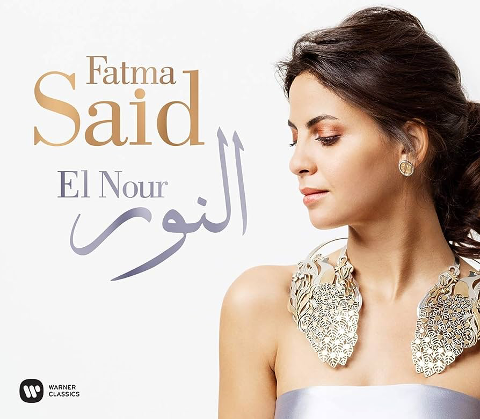EL NOUR – FATMA SAID
“El Nour” – Fatma Said Illuminates Musical Horizons
Sarah Dunlop, April 2020
Fatma Said’s debut recital album, “El Nour,” is a captivating exploration of cultural intersections and vocal prowess. The CD showcases an array of musical talents and styles, blending the enchanting voice of the Egyptian soprano with masterful accompaniments from a diverse ensemble. Recorded in 2020 at the historic Jesus Christus Kirche in Berlin, Germany, this album presents a unique journey through songs from France, Spain, and Egypt, marked by Said’s distinctively clear and translucent soprano.
The recital opens with Maurice Ravel’s song cycle “Shéhérazade,” delivered in its original piano and voice version. Fatma Said’s exquisite interpretation, under the skillful accompaniment of Malcolm Martineau, offers an intimate portrayal of each piece’s delicate poetry. In “Asie,” the first song of the cycle, Said’s soprano glimmers with a sense of mystery, guided by Martineau’s finely balanced piano performance. The inspired inclusion of a Middle Eastern Ney Flute in “La Flûte Enchantée” adds a layer of cultural authenticity, seamlessly intertwining with Said’s playful yet nuanced delivery.
Throughout the French selections, Said’s vocal finesse shines brightly, evoking emotions ranging from playful flirtation to profound introspection. Her rendition of Berlioz’s “Zaide” stands out for its ability to convey both festive Spanish joy and underlying emotional depth. Said’s connection to the text and her ability to live within each moment of the song lend her performance a remarkable authenticity.
The Spanish segment of the album showcases Said’s versatility and connection to the Hispanic culture. Accompanied by the sensitive guitar playing of Rafael Aguirre, her rendition of Federico García Lorca’s “Sevillana” radiates triumphant energy, while her interpretation of the lullaby exhibits the haunting beauty of her lower register. Comparisons to Victoria de los Angeles are apt, as both artists possess a keen intelligence in their vocal delivery, but Said’s approach, characterized by a more direct and concentrated tone, distinguishes her.
However, what truly sets “El Nour” apart is the inclusion of Egyptian songs, a notable departure from the traditional European repertoire. Said’s collaboration with a jazz quartet in the poignant ballad “Sahar El Layali” offers listeners an entrancing glimpse into contemporary Egyptian music. These songs not only showcase Said’s ability to adapt to diverse musical landscapes but also enrich the album’s global perspective.
The recording quality of the album is exemplary, capturing the intricate details of both voice and instrumentation in the acoustic splendor of the Jesus Christus Kirche. The English translations of the sung texts enclosed with the CD allow listeners to fully engage with the emotional nuances of the songs.
Fatma Said’s “El Nour” illuminates the listening experience with its delicate yet powerful performances. This debut recital album demonstrates her musical depth and range, offering a vibrant mosaic of cultures and emotions. As she navigates effortlessly between languages and styles, listeners are treated to a truly captivating musical journey. With this remarkable introduction, it’s evident that Fatma Said has a promising artistic future ahead, both on record and on the stage.

